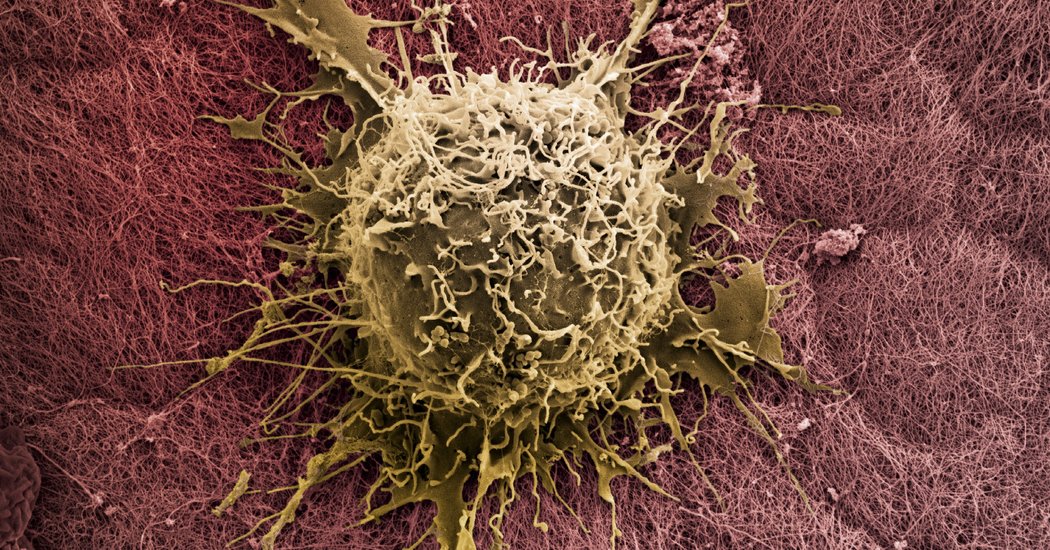Scientists Discovered a Bone-Deep Risk for Heart Disease

It’s been one of the vexing questions in medicine: Why is it that most people who have heart attacks or strokes have few or no conventional risk factors?
These are patients with normal levels of cholesterol and blood pressure, no history of smoking or diabetes, and no family history of cardiovascular disease. Why aren’t they spared?
To some researchers, this hidden risk is the dark matter of cardiology: an invisible but omnipresent force that lands tens of thousands of patients in the hospital each year. But now scientists may have gotten a glimpse of part of it.
They have learned that a bizarre accumulation of mutated stem cells in bone marrow increases a person’s risk of dying within a decade, usually from a heart attack or stroke, by 40 or 50 percent. They named the condition with medical jargon: clonal hematopoiesis of indeterminate potential.
CHIP has emerged as a risk for heart attack and stroke that is as powerful as high LDL or high blood pressure but it acts independently of them. And CHIP is not uncommon.
The condition becomes more likely with age. Up to 20 percent of people in their 60s have it, and perhaps 50 percent of those in their 80s.
“It is beginning to appear that there are only two types of people in the world: those that exhibit clonal hematopoiesis and those that are going to develop clonal hematopoiesis,” said Kenneth Walsh, who directs the hematovascular biology center at the University of Virginia School of Medicine.

The growing evidence has taken heart researchers aback. Dr. Peter Libby, a cardiologist at Brigham and Women’s Hospital and professor of medicine at Harvard Medical School, calls CHIP the most important discovery in cardiology since statins.
“I’m turning part of my lab to work on this full time,” Dr. Libby said. “It’s really exciting.”
The mutations are acquired, not inherited — most likely by bad luck or exposure to toxins like cigarette smoke. But there is little that patients can do.
Brian Gear, a project manager at a Boston company that analyzes health care data, was given genetic testing by doctors at Dana-Farber Cancer Institute because his mother had had a blood cancer that can be inherited.
The diagnosis was CHIP, something he had never heard of. And because it dramatically increased his risk of heart disease, it was life-changing.
“It is almost like a Ph.D. in letting go of control,” said Mr. Gear, who said he was in his mid-30s. “As much as you want to have a plan and a destiny, you also have this thing. It’s scary and it’s terrifying.”
“I don’t want to use the word time-bomb, but that’s how it feels,” he added.
CHIP was discovered independently by several groups of researchers who were not even investigating heart disease. Mostly, they were looking at the genes of patients who might develop leukemia or, in one research project, schizophrenia.
The scientists searched databases from genetic studies involving tens of thousands of people whose DNA had been obtained from their white blood cells.
To their great surprise, the teams converged on the same phenomenon. Unexpectedly large numbers of study participants had blood cells with mutations linked to leukemia — but they did not have the cancer. Instead, they had just one or two of the cluster of mutations.
“This clearly wasn’t happening by chance,” said Steven McCarroll, a geneticist at the Broad Institute and Harvard Medical School. “We knew we were onto something, but what were we onto?”
The investigators quickly guessed the broad outlines.
White blood cells, the attack dogs of the immune system, arise from stem cells in the bone marrow. Every day, a few hundred such stem cells spew out blood cells that begin dividing rapidly into the 10 billion needed to replace those that have died.
Sometimes, by chance, one of those marrow stem cells acquires a mutation, and the white blood cells it produces carry the same mutation.
“Some mutations are just markers of past events without any lasting consequence,” said Dr. David Steensma, a blood cancer specialist at Harvard Medical School and Dana-Farber Cancer Institute.
But others, especially those linked to leukemia, seem to give stem cells a new ability to accumulate in the marrow. The result is a sort of survival of the fittest, or fastest growing, stem cells in the marrow.
“Some mutations may alter the growth properties of the stem cell,” said Dr. Steensma. “Some may just make the stem cell better at surviving in certain less hospitable parts of the bone marrow where other stem cells can’t thrive.”
The mutated stem cells outlast normal stem cells in the marrow, and their progeny — an increasing percentage of white blood cells — show up in the blood with mutations.
Perhaps the most extreme example of how this can play out was reported in 2014, when researchers described a 115-year-old woman. Nearly her entire supply of white blood cells was generated by mutated stem cells in her bone marrow.
At the first she had developed just two mutated stem cells. But over time their progeny came to dominate her bone marrow. She lived about as long as a human can, nonetheless, and died of a tumor.
But the big surprise came when researchers looked at the medical records of people with these white blood cell mutations. They had 54 percent increase in the odds of dying within the next decade, compared to people without CHIP And the cause: heart attacks and strokes.
Dr. Benjamin Ebert, chair of medical oncology a the Dana-Farber Cancer Institute, was the first to see the link. He turned for help to Dr. Sekar Kathiresan, a cardiologist and genetics researcher at the Massachusetts General Hospital and the Broad Institute, who had genetic data from four more large studies.
They confirmed that CHIP doubled the risk of a heart attack in typical patients — and increased the risk fourfold in those who had heart attacks early in life.
But how might mutated white blood cells cause heart disease? One clue intrigued scientists.
Artery-obstructing plaque is filled with white blood cells, smoldering with inflammation and subject to rupture. Perhaps mutated white cells were causing atherosclerosis or accelerating its development.
In separate studies, Dr. Ebert and Dr. Walsh gave mice a bone-marrow transplant containing stem cells with a CHIP mutation, along with stem cells that were not mutated. Mutated blood cells began proliferating in the mice, and they developed rapidly growing plaques that were burning with inflammation.
“For decades people have worked on inflammation as a cause of atherosclerosis,” Dr. Ebert said. “But it was not clear what initiated the inflammation.”
Now there is a possible explanation — and, Dr. Ebert said, it raises the possibility that CHIP may be involved in other inflammatory diseases, like arthritis.
For now, doctors advise against testing for CHIP, since there is nothing specific to be done to reduce the increased risks of cancer or heart disease that it confers.
But, he said, if people really want to know if they have CHIP, they can get a blood test that costs a few thousand dollars. (If there is no particular reason for the test, insurance may not pay.)
Dr. Steensma said that if he had CHIP, he would make sure he did his best to control all of his heart disease risks, like cholesterol and blood pressure, and that he had a healthy diet and exercised. Drugs may be developed to help stem the inflammation in arteries, he added.
As for the cancer risk, Dr. Ross Levine at Memorial Sloan Kettering Cancer Center just opened a C.H.I.P clinic in part to explore whether some patients with CHIP have a greater risk of blood cancers, and if so, what to do about it.
At the moment, CHIP is mostly found accidentally in patients who are genetically tested for other reasons — like Brian Gear. The diagnosis stunned him, but it also has brought into focus the important things in his life.
“There are thing I love in life and people I love,” he said. “You try to live that life.”
Source by:- nytimes
Share:




